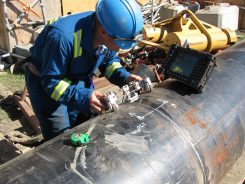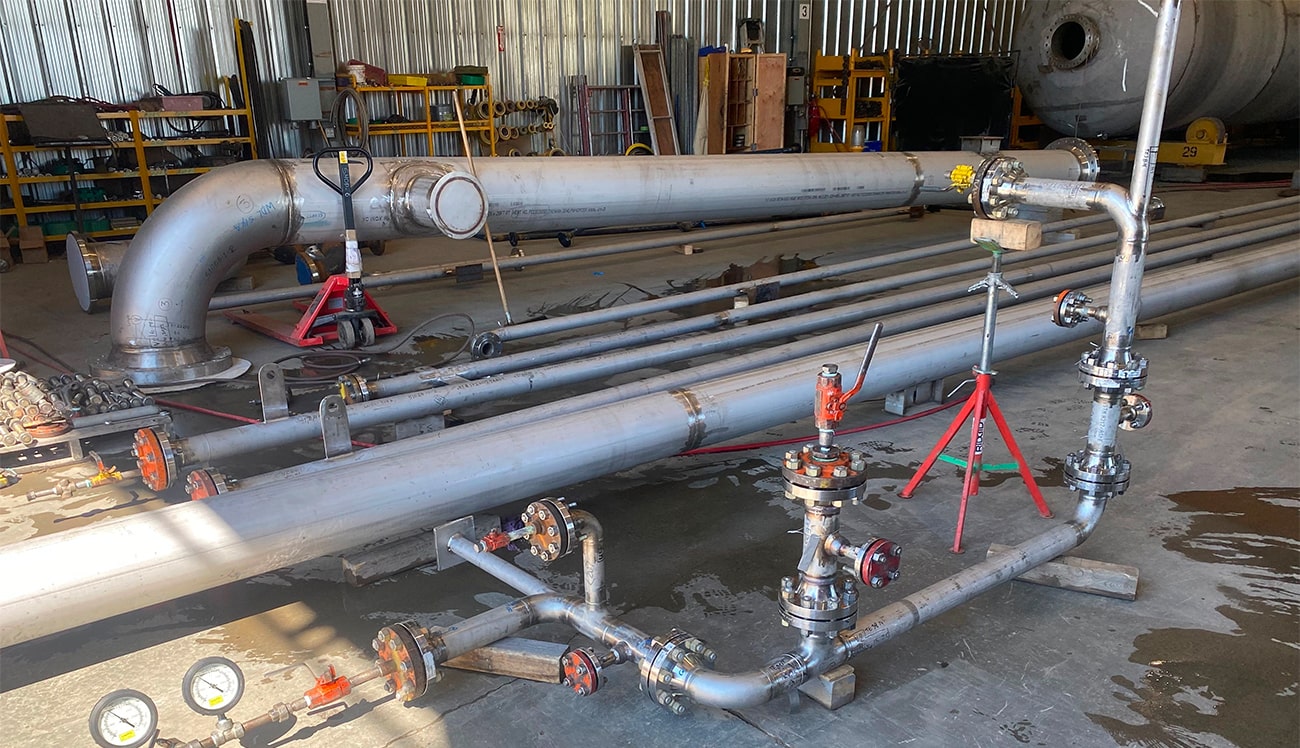Quality Control Assured: Specialist Pipeline Welding Inspection Solutions
Quality Control Assured: Specialist Pipeline Welding Inspection Solutions
Blog Article
Maximizing Efficiency: Pipe Welding Inspection Best Practices
By executing finest practices for pipe welding assessment, companies can streamline procedures, decrease errors, and enhance task timelines. The thorough interest to detail needed in welding assessment holds the crucial to the long-term durability and integrity of the pipelines, making it a topic of utmost importance in the industry.

Importance of Efficient Welding Inspections
Reliable welding inspections play a critical function in guaranteeing the architectural integrity and security of pipes. Proper examinations are necessary to recognize any type of defects, suspensions, or flaws in the welded joints that can compromise the general integrity of the pipeline system. By conducting complete examinations, inspectors can find problems early on, preventing prospective leaks, tears, or failures that can have serious environmental and security repercussions.
Prompt and accurate welding inspections additionally assist in preserving compliance with market requirements and laws. Abiding by these criteria is not only a legal requirement however likewise a needed action to guarantee the reliability and longevity of the pipes. Effective evaluations can add to cost financial savings by reducing the demand for pricey fixings or replacements due to welding problems that could have been prevented or corrected throughout the inspection process.
Utilizing Innovation for Inspections
To boost the effectiveness and accuracy of pipe welding examinations, the combination of innovative innovations has actually come to be progressively crucial in making sure extensive and exact assessments of welded joints. Using technology for evaluations offers many advantages, consisting of raised efficiency, boosted accuracy, and enhanced precaution. One of the vital technical innovations in pipeline welding examinations is using automated ultrasonic screening (AUT) systems. These systems can check welds quickly and accurately, supplying detailed information on possible issues or issues within the weld joint. In addition, remote visual inspection (RVI) devices such as robotic spiders equipped with video cameras enable inspectors to accessibility and review difficult-to-reach locations without the requirement for substantial disassembly or hands-on treatment. Furthermore, the execution of electronic systems for data evaluation and reporting simplifies the examination procedure, enabling real-time information interpretation and seamless documents. By embracing these technical services, pipeline welding assessments can be performed better, resulting in better welds, improved general security, and reduced task timelines.
Developing Clear Inspection Protocols
Establishing clear inspection methods is important for ensuring uniformity and reliability in the pipeline welding evaluation process. These protocols function as a collection of guidelines that detail the certain actions, criteria, and methods to be adhered to throughout examinations. By plainly defining the evaluation methods, all inspectors associated with the process can comprehend their responsibilities and roles, causing a much more standardized and reliable evaluation workflow.

Routine review and updates to the examination procedures are likewise vital to adjust to transforming industry criteria and requirements. By continually refining and enhancing the procedures based upon feedback and lessons found out, pipeline welding evaluations can promote the best quality criteria and governing compliance.
Training and Accreditations for Assessors

Educating and qualifications for assessors are extremely important in making sure the competence and proficiency of individuals charged with managing pipe welding processes - Pipeline Welding Inspection. Effectively educated examiners possess the required knowledge and skills to successfully examine weld high quality, adherence to welding procedures, and conformity with sector criteria and laws
Certifications, such as those supplied by the American Welding Culture (AWS) or the American Petroleum Institute (API), verify an examiner's experience and capacity to do assessments to the highest standards. These accreditations typically require strenuous training, evaluations, and continuous expert growth to make certain that assessors stay current with the current innovations in welding innovation and evaluation methods.
In addition to formal qualifications, continuous training programs play a critical duty in boosting assessors' capabilities. These programs cover a variety of subjects, consisting of welding processes, issue detection, safety and security methods, and appropriate codes and criteria (Pipeline Welding Inspection). By investing in comprehensive training and qualifications for assessors, firms can support the stability of their pipeline welding tasks and alleviate the risks related to subpar welds
Continuous Renovation in Assessment Processes
Structure upon the foundation of skilled and certified inspectors, continual renovation in examination procedures is crucial for guaranteeing the continuous high quality and compliance of pipeline welding operations. By implementing a system of continuous enhancement, pipe welding evaluation processes can evolve to fulfill the transforming needs of the industry, technological innovations, and governing requirements. This entails consistently assessing and examining inspection tools, treatments, and methods to recognize areas for improvement.
One secret aspect of continual improvement in examination processes is feedback. Collecting input from examiners, welders, engineers, and other stakeholders allows for a detailed assessment of existing read here practices and the recognition of potential locations for improvement. In addition, leveraging analytics and information can offer more information beneficial insights right into the effectiveness of assessment procedures, allowing educated decision-making for optimization.
In addition, spending in training and growth programs for inspectors can make sure that they are equipped with the most up to date expertise and skills to do their obligations successfully. Constant improvement is a dynamic procedure that needs devotion and commitment from all stakeholders to drive quality in pipeline welding assessment methods.
Final Thought
To conclude, making best use of effectiveness in pipeline welding inspections is vital for making certain the quality and safety and security of infrastructure tasks. By using innovation, developing clear procedures, supplying correct training and accreditations for inspectors, and continually improving evaluation processes, organizations can streamline their operations and minimize dangers. It is necessary for industries to focus on efficient welding evaluations to keep high requirements and meet governing needs.
Reliable inspections can contribute to cost savings by decreasing the requirement for expensive repair services or substitutes due to welding flaws that can have been stopped or corrected find more info throughout the assessment procedure.
Developing clear inspection protocols is vital for ensuring consistency and dependability in the pipe welding evaluation process. By clearly specifying the assessment protocols, all examiners included in the procedure can comprehend their duties and obligations, leading to an extra standard and efficient examination workflow.
Clear evaluation procedures assist in minimizing the probability of mistakes or oversights throughout the assessment procedure.Structure upon the structure of experienced and certified inspectors, continuous renovation in examination procedures is crucial for making sure the continuous high quality and compliance of pipeline welding operations.
Report this page